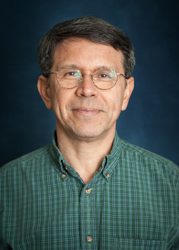News Releases
April 25, 2014
For additional information:
Chato Hazelbaker
Chief Communications Officer
Telephone: 360-992-2921
Email: chazelbaker@clark.edu
Democracy or Dictatorship?
Prof. Carlos Castro examines Central American case studies in the latest installment
of the Clark College Faculty Speaker Series on May 8
 |
|
| Professor Carlos Castro |
VANCOUVER, Wash.–What makes one country develop into a democracy, and another into a dictatorship? That is the question at the heart of Clark College sociology professor Carlos Castro's upcoming lecture, "Borderlines: Political and Economic Differences between Nicaragua and Costa Rica."
Costa Rica is one of the richest countries in Central America while its neighbor, Nicaragua, is one of the poorest. Costa Rica has a liberal democratic system, while Nicaragua is more authoritarian. What led these neighboring countries to develop so differently? Carlos Castro, professor of Sociology, will offer his interpretation of why two neighboring countries with strong cultural similarities can differ so dramatically.
"Nicaragua and Costa Rica pose an interesting case study," says Castro. "They are so close and yet so different. The lessons to be drawn from them could apply to many nations and regions of the world wrestling with issues related to social, political, and economic development."
This event, which is free and open to the public, is scheduled to take place Thursday, May 8, from 4:00 p.m. to 5:00 p.m., in the Ellis Dunn Community Room (GHL 213). It is being held in conjunction with Clark College's Celebración de mi Gente.
Individuals who need accommodation due to a disability in order to fully participate in this event should contact Clark College's Disability Support Services (DSS) Office at 360-992-2314 or 360-991-0901 (VP). The DSS office is located in room 013 in Clark's Penguin Union Building.
About Professor Carlos Castro
A native of Nicaragua, Carlos Castro graduated cum laude from the University of Oregon with Bachelor of Arts degrees in sociology and economics. Continuing his studies at the University of Oregon, Castro earned a master’s degree in public affairs (MPA), master’s degree in community and regional planning (MCRP) and a PhD in sociology. He began teaching at Clark College in 2006 and received tenure in 2009. An essayist and poet as well as an academic, Castro's work has appeared in such publications as Organization and Environment, El Nuevo Diario, The American Poetry Review, La Prensa Literaria, Confidencial, and Nuevo Amanecer Cultural. He is currently working on a book comparing and contrasting the development of Nicaragua and Costa Rica, research for which will be the foundation of his Faculty Speaker Series presentation.
About the Clark College Faculty Speaker Series
Established by Clark College with support from the Clark College Foundation, the Clark College Faculty Speaker Series honors individual faculty members and celebrates academic excellence. The series showcases recent experiences that have enriched both the life and teaching of a Clark faculty member. Faculty members share their developmental experiences with the college community—and with members of the community at large—while addressing some of today’s most intriguing issues. Visit http://www.clark.edu/news_center/events/facultyspeakerseries.php for more information about this and upcoming Faculty Speaker Series presentations.
####